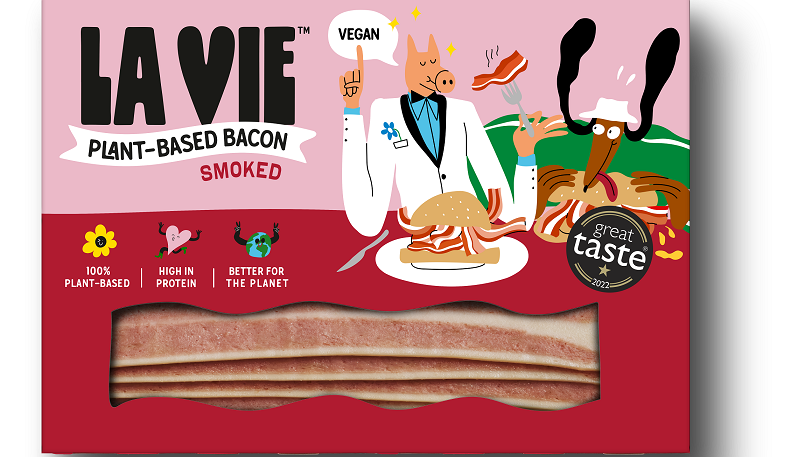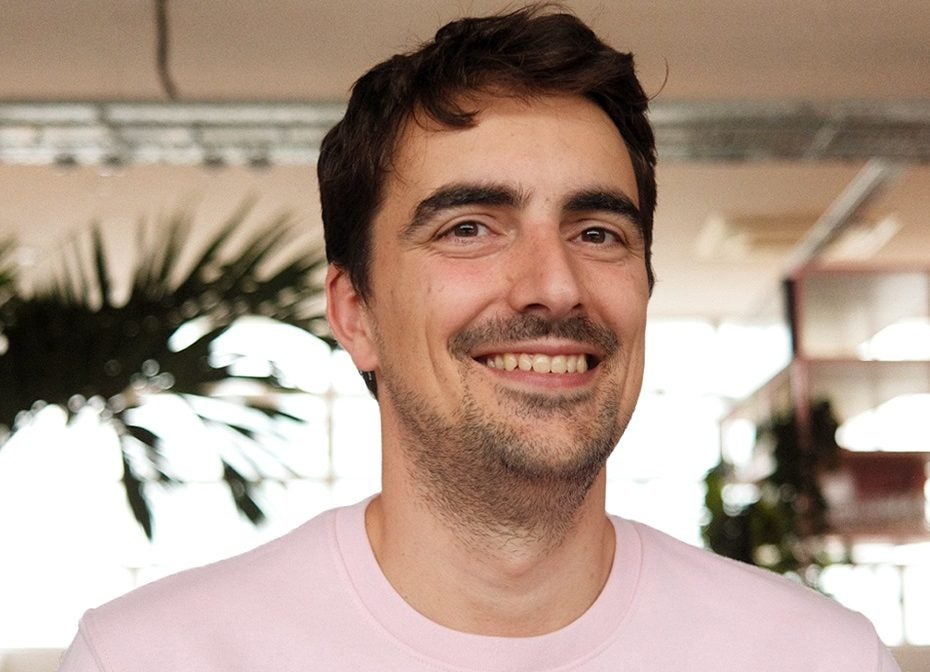
France-based La Vie markets plant-based alternatives to pork products like ham and bacon. Set up in 2019, the company has built a business selling into retailers on both sides of the English Channel, including Tesco in the UK and Carrefour in France.
While continuing to look to grow its retail business, La Vie is also building other sales channels, working with foodservice operators such as Burger King and Accor, as well as supplying its products as ingredients to food-to-go manufacturers like Greencore.

Discover B2B Marketing That Performs
Combine business intelligence and editorial excellence to reach engaged professionals across 36 leading media platforms.
Just Food sat down with Emily Giles, La Vie’s head of UK sales, and Nicolas Schweitzer, the company’s co-founder and CEO, to discuss its plans, targets and the plant-based category more widely.
Dean Best (DB): You’re putting some marketing investment behind La Vie in the UK. What’s your presence there?
Emily Giles (EG): I’d say we’ve still got a lot of headroom for growth but, for a challenger brand, we’ve got off to an incredible start. We launched with Sainsbury’s on their Future Brands programme and with Waitrose at the same time. We launched with our two hero SKUs – our bacon and lardons. Our partnership with Sainsbury’s and Waitrose really laid the foundation for us to build our brand, get great presence and win listings with retailers like Tesco, Ocado. We’re in advanced conversations with all other major grocers. The other benefit that came with Sainsbury’s, which has helped us get really great traction in the UK and elevate some of our campaigns is our partnership with their food-to-go business. We did two co-branded sandwiches with them.
So, that’s what we’ve been working on: leveraging our brand through the classic aisle purchasing on a shelf and then leaning on our taste credentials through partnerships in manufacturing, through Greencore, through sandwiches and food-to-go.
In 2022 we did just under £300,000 [in UK sales]. In 2023, we exited at about £1.3m. Our target this year, which we are getting on track to deliver, is just over £4m and then lofty ambitions to 2026, which is all looking very positive.

US Tariffs are shifting - will you react or anticipate?
Don’t let policy changes catch you off guard. Stay proactive with real-time data and expert analysis.
By GlobalDataDB: What are those lofty ambitions?
EG: By 2026 in the UK, we want to do £10m.
DB: How do you think you’ll achieve that?
EG: As head of retail in the UK, I manage all of our sales channels – traditional retail, foodservice and then a new channel on which we are putting a lot of focus and attention, which is products and ingredients in manufacturing. That is showing people they can enjoy plant-based in a sandwich, in a pizza, in a meal solution and it still tastes delicious, so a lot of our growth will come from products and ingredients.
DB: Have you started any moves in ingredients yet?
EG: The first partnership was with Greencore and we’re in the process of onboarding some NPD with them, which would then be available for 2025. Greencore at the moment predominantly do food-to-go for us – so, sandwiches and salads – but they also have a huge meal-solution business. They have lots of other channels as well, quiches and pies and things like that. Then there are some other manufacturers that we’re in advanced conversations with and I’m not going to jinx it now but that’s a very exciting channel for us. Then we have our traditional wholesalers, so our Brakes and our Bidfoods that supply a lot of our key end-customers. The most growth will come from retail delivering that £10m.
DB: Out of that £10m, what proportions would come from each of the sales channels, roughly speaking?
EG: We’re working through the apportionment at the moment. Two-thirds would come from retail and then the rest would come from products, ingredients and foodservice.

DB: What has sparked the desire to diversify further? Is it the slowing of the plant-based market at retail?
EG: I think we need to protect the business a little bit given the challenges the retail category has faced. We are seeing that pendulum start to swing back the other way.
And the volume is amazing in those channels. We’ve really stumbled across it with Greencore. On a single sandwich, I think we did something like £300,000, unbelievable. I would say it’s a channel that is quite slow to get going but, once it gets going, the momentum is amazing. The real kicker for us is we could get our co-branding on to pack. People could enjoy the sandwich, associating La Vie with a great-tasting product and then it has this halo effect when they see us on a shelf on Sainsbury’s and Waitrose. It’s in its infancy at the moment but that £10m is sort of seeing that virtuous cycle coming to fruition.
Nicolas Schweitzer (NS): I think it’s quite specific to our product portfolio in that, since we are only doing plant-based charcuterie, they are actually the perfect types of products to get into meal solutions. What we love about it is that, as Emily was mentioning, it might not be the best margins but it’s the best way to educate consumers. The barrier in terms of perception between buying a sandwich in a meal deal where you take very little risk, or buying just a tray with plant-based products, and you don’t know if it’s going to be good or not, is much lower. We hope that by educating consumers through ready-to-eat meals it will benefit the retail side of the business.
DB: What investment will you have to make in production to support the ambitious sales targets in the UK?
NS: As it turns out, we are doing pretty much all of our production in the west of France. We have pretty much massive capacity, which is one of the reasons we are able to do products as ingredients. We are not even looking at the consequences on capacity because we have we have plenty.
DB: Where does the UK rank in your markets outside of France?
NS: France is the core market because that’s where we started. Today it’s about 50% of the business. Then, we have the UK, which is growing and the velocities in retail are pushing us to invest more in the UK. Then the rest will be either industrial partners, so industrial clients, or a Burger King, who is doing a big chunk, who is a big customer for us as well. We are with them in ten countries in Europe.
DB: Are there other international markets you’re looking at?
NS: This is the outcome of a lot of strategic sessions. We realised we had to focus on France and the UK because we have so much potential in those markets. Emily was mentioning £10m but, if we really crack it, in terms of the UK market, it could go even further. We see the velocities growing and growing and we don’t know what’s the ceiling – or if there is a ceiling.
DB: What are you looking for the company’s annual sales to be in 2024?
NS: For the whole company, it will be about €15m ($16.1m). Actually, in official revenue, it will be more like €20m but we are interested in net sales and not royalties.
DB: Is the business profitable yet?
NS: Not yet but it will be in 2026. If we fundraise again, it will be just to open a new country like the United States.
DB: Focusing on your presence in France, do you sell through the major retailers?
NS: We have a much better distribution in France. Out of the entire veggie section, our products are in the top performers. La Vie as a brand is the largest contributor to the plant-based category in France and we see that the business is growing and growing.
DB: How though are you looking to expand your business in France?
NS: We just released three sandwiches in France, which are La Vie-branded. It’s still a bit too soon to know the performance but, so far from the initial database we have, it looks extremely promising.
DB: What opportunities are there for La Vie in France’s foodservice sector?
NS: France is France so there is always a lot of resistance in terms of, conceptually, it’s not always easy to convince the chef until they try it. France is very much about taste. Once the chef tries it, it can go through quite fast. We had an experience with Accor, the hotel chain. I don’t think anyone was ever as reluctant as the head chef of Accor and we convinced him to give it a shot. He was mindblown by the products, so we are now listed at Accor. We have hotels across brands offering plant-based bacon.

I think the reality is people are also realising that there is demand for it, not so much demand in terms of vegans banging on the door because the vegan community is pretty much non-existent in France but, if you look at Burger King, we started two years ago with them in France. They had zero revenue in plant-based and, in two years, it is now 20% of their sales. It is a massive success but the reason for the success is quite clear. They only offer delicious products at the same price as meat, so then you get the vegans, vegetarians and flexitarians.
DB: Therefore, by 2026, what are you looking for La Vie’s group sales to be?
NS: At least €50m. There is a plan [for] higher. The minimum is €50m.
DB: Staying on France, what’s the status of the legislation to ban plant-based food producers from using ‘meaty’ terms?
NS: So, the ban was suspended by the Conseil d’État. Right now, it’s in the hands of the European Court of Justice. It would be very surprising if the European Court of Justice gave an unfavourable ruling but we will see.
DB: More broadly, have you had any thoughts about what the snap election in France and a victory for the National Rally could mean for plant-based producers?
NS: Traditionally, the extreme right has been very vocal about keeping meat – and especially pork – at the centre of the traditions, etc. On the one hand, it could be a bit tricky. However, on the other hand, look at everything they’ve been saying on sovereignty in terms of food, at least at the European level. When you look at the imports from Latin America of soy to feed pigs, it’s insane. I don’t think people realise how insanely dependent we are on soy imports from Latin America. If we manage to communicate this and the fact that, actually, plant-based foods are a very good tool in terms of European food sovereignty, I think it might not be too bad.

DB: The plant-based market has slowed in the US and the UK, two of its most prominent markets. How is the category faring in France?
NS: The category is still growing in France quite significantly. However, in general, I think it’s fair to say we’ve all been disappointed by the evolution of the category in the US, in the UK, and in France. In general, we were all hoping for a big cultural shift around meat, which didn’t happen but, for me, what’s happening is extremely healthy. We’re seeing retailers kick off all the bad products, or most of the bad products. This is a necessary step because, every time someone buys a plant-based product and it’s disgusting, or it has terrible nutritionals or 50 ingredients, they just don’t come back to the category.
We’re seeing retailers kick off all the bad products, or most of the bad products. This is a necessary step
Nicolas Schweitzer
It’s a retailer’s job to actually filter and ensure they only offer plant-based products that taste great, that have clean labels, a very short ingredient list. We always have less ingredients than pork on 100% of our products. It’s not just us. I think the entire category as a whole is starting to increase significantly in quality.
Our current ingredient lists are very clean, the taste … for me, it’s just that we tick the boxes. That’s why the rotations keep increasing. Where I think we need to work is on the price. Our price is a bit too high compared to what I would like it to be in terms of competitiveness.
DB: How will you look to start to move your prices down?
NS: One thing that is really not helping at all obviously is meat subsidies. Compared to meat, obviously, we’re expensive. We’ve decided not to lower our protein content because that’s what’s expensive in the product. We could be at 8% protein and be significantly cheaper but we feel, in the long run, the market will recognise this and it’s not in our interest. It’s back to economies of scale on our side. At a regulatory level, in a dream world, the meat subsidies would start being pulled off, which makes a lot of sense when you look at global warming, but that’s too optimistic.
DB: Is La Vie looking to raise more funds?
NS: Right now, it’s not in the plans. If we do fundraise, it will be to finance the launch of a new country basically. We would love to. We get hundreds if not thousands of requests from consumers to come to the US. It’s just a tough cookie.
DB: What’s holding you back?
NS: Well, the fact is the category is not performing very well. There are massive investment costs to get started in the US because you have listing fees that are very significant, unlike other markets, and we’re just not there yet in terms of scale, I think. Once, we have cracked 100% the UK and France I feel like it will be easier to kick off [in the US]. Maybe it won’t be directly, maybe it will be through a partner. We’re looking at different options.





